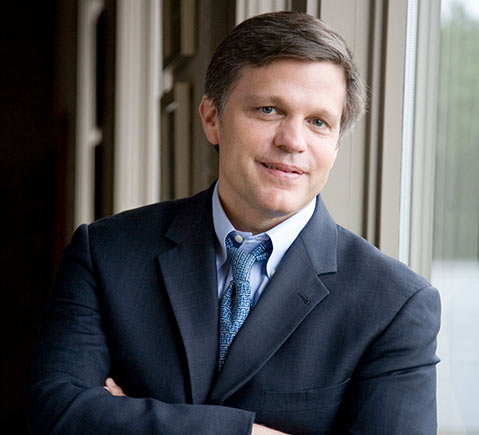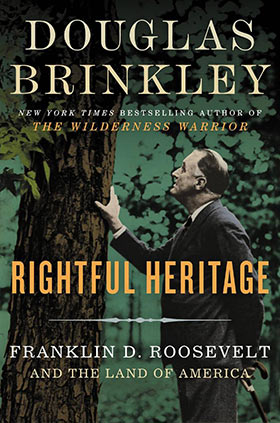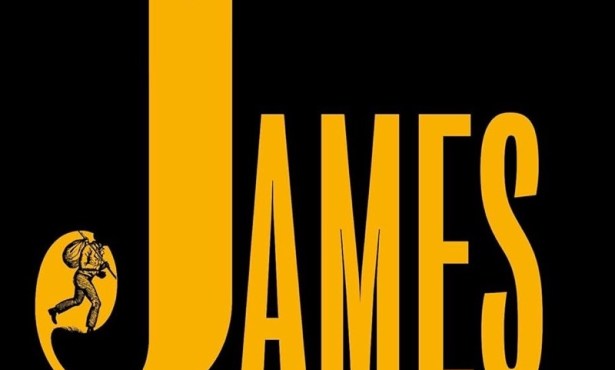Douglas Brinkley Ponders Trump
Presidential Historian Comes to Town Jan. 26.

Next Thursday, presidential historian Douglas Brinkley will be in Santa Barbara, ostensibly to describe how U.S. leaders from Teddy Roosevelt to Barack Obama contributed to the national park system, a subject about which Brinkley knows and cares very passionately. He may eventually get around to discussing that topic, but as one of the three best known presidential historians in the country, all anyone wants to hear about is President-elect Donald Trump. Fortunately, that’s a subject about which Brinkley also knows and cares very passionately.
Onstage, Brinkley is a marvel to behold. He appears to take one deep breath, and then for about an hour — as if trance-channeling the past — he exhales a vast cloud of astonishing facts, anecdotes, and analysis, much of which seem new, fresh, and surprising, no matter how old and dated they may be. Conspicuously absent are any false starts — “ums” or “ahs.” And it all goes to a point. I recently got to spend a few minutes on the phone chatting with Brinkley, who has written a new book, Rightful Heritage detailing Franklin D. Roosevelt’s omnivorous obsession with preserving America’s great open spaces. The subject of that book, somehow, never managed to come up. The following is an edited version of our conversation.
Any immediate thoughts with the inauguration right around the corner? When Franklin Delano Roosevelt [FDR] came in, he wouldn’t even talk to [incumbent president] Herbert Hoover. He denounced Hoover, didn’t want to be seen in the same photo. On the drive to the inaugural in the famous March of 1933 “We have nothing to fear but fear itself” address, Herbert Hoover rode in the car with FDR. But he turned his head away from him and wouldn’t look at FDR or say anything to him. So the prospect of seeing Trump with Hillary Clinton is not as tense in some ways as it was between FDR and Hoover. The point of history is to remind us that our own times are not uniquely oppressive.
I did study history, but it’s hard to see a whole lot of precedents. Trump’s not like anybody. There’s some Richard Nixon in him. Certainly his attack on the media, just hard disdain for the press is deeply Nixonian. He has some traits politically of the conservative Ronald Reagan. On issues of being a novice in politics, the closest comparison may be Warren Harding, who surrounded himself with business cronies and thought you could run the United States as if it were a large company. But I don’t think we’ve ever had a president quite like Trump. But we never had one like Barack Obama for a different reason. Reagan was well-known for decades, and he had the ability to use television to his benefit, and Reagan was a great showman.
How much is it a function of fame and celebrity? The fact of the matter is America is about celebrity. Trump’s been one for decades now and has a brand that he’s built, and there were just enough Americans that bought into it to elect him president. There’s something there with the whole Andy Warhol bit that fame has become the god of America. And also getting rich quick. Trump picks up on the Las Vegas idea in Atlantic City: You may be blue-collar working class, but you too can be rich someday. It’s the opposite of Obama, who was the Horatio Alger story of hard work, and do your homework and work, and be ethical and you’ll rise in America. Trump is about making it big quick. He plays on the fantasy life of certain segments of the population. The media may have underestimated what’s involved in running a casino: these little bells and whistles, all the shrimp you can eat, free TV — all those things are deeply attractive to a large segment of working-class America. I think once you get a college degree, you look down on that. Trump couldn’t afford to look down on those people because they were the ones making him money. He got to understand a certain part of the American character that I think a lot of college-educated people had turned their back on.
Is there any broader sense to be made of this? It’s a global phenomenon. Brexit was a preamble for the Trump election; the European Union is starting to fray. There’s a real feeling in Europe of fear of new waves of immigrants. I think 9/11 and terror attacks in general have created kingdoms of fear in Western Europe and the United States. So Trump is sort of part of a larger global phenomena right now, and it will run its course at some point. But there are a lot of Americas that are afraid for their security: school shootings like Sandy Hook, a nightclub in Orlando become terror targets. We do media saturation of those terror events. Trump is able to convince people, “I’ll be tougher. I’ll get the bad guys.”
On election night, you were one of the only commentators prepared for Trump victory. How’s that? I grew up in Ohio. My father worked [in] downtown Toledo. I went to the Ohio State University, and I went to a public high school, and I stayed in touch with all my friends. I know a bunch of them that voted for Obama twice but voted Trump this time. And it really was the anti-NAFTA message. There is a feeling that the so-called Rust Belt has been gutted and that Hilary Clinton didn’t seem to want their vote enough. You know for every five visits Trump made to the Toledo area, Hillary made one. For every 15 visits to Wisconsin he made, she never showed up. And you wouldn’t think people would vote like that, but they did.

Shortly after the election, you were on air with [New Yorker writer] Jeffrey Toobin, where you famously told him to take a chill pill, that it wasn’t necessarily the end of the world. When you live in New York and Washington and you’re covering politics as a journalist, every day seems gigantic. But when you look back from the 1,000-year perspective, I have faith in the American economy, American universities, our checks and balances. We’ve seen many dark days in American history, and I think we have to put the Trump victory into perspective and not get unconstructive about it. I live in Austin, Texas, and I see conservatives and liberals. I think at the local level there’s still this great American unity. At the same time, our country is divided in a way it hasn’t been since the 1860s. I’m still trying to find ways we can unify our country. It may not happen.
Any thoughts about his first press conference? There’s been nothing like it. It’s what Nixon tried to do covertly, but Donald Trump is very overt. He truly is ignoring all political rules and throwing out the playbook of previous administrations and is going it alone in a very radical way.
How do you think the story about the Russians spying on him and the dossier with allegations about golden showers played? It seems to have helped him. Walter Cronkite used to say you could make it big in journalism by being the first or you can get it right and have a long career. I think things have sped up a lot, and with so many different new outlets like BuzzFeed news and others, they want to come first. I’m not sure what’s gained by not hesitating a little bit ’til we get facts down. Anytime a report is not correct, it’s only going to serve Donald Trump’s “fake news” narrative.
How should the media respond? You just have to keep digging and keep doing what you’re going to do; [Trump’s] somebody who thrives on feuds. It’s going to be a roller-coaster ride. Whoever seems to be going at him on a particular story, he wants to find a way to punish. You can’t let Donald Trump get in your head. You just have to stick to trying to report the facts. It’s all about news and truthl, not about Trump. You just can’t let him control your professional or emotional life.
How would Cronkite have responded? Cronkite had enough gravitas with the American public; by 1981 when he left, there was about a 60-70 percent public approval rating for the media and journalism. It’s down to like 10 percent right now. That’s a big leap. Why was Walter Cronkite the most trusted man in America and today the media is held in such low esteem? It’s because of the morphing of news and entertainment. We give what Lindsay Lohan does equal footage to our troops in Afghanistan. Cronkite was very worried about that trend. And then Trump has the luxury of calling on Breitbart and an alternative media. “I don’t need to talk to you guys like CNN or MSNBC. That’s my prerogative. It’s not in the Constitution that I have to call on a CNN reporter.” That’s the way he’s going to play it. So what do you do? You just try to show up and try to get in there with your questions, but meanwhile just keep digging and following up.
The conflict-of-interest issue seems new to Trump. Nothing like it! He’s ripe for conflict-of-interest charges, but saying it every day is boring, too. One thing Trump makes clear, he thinks in terms of winning and losing, legal and illegal. And his MO is “If what I’ve done is illegal, why aren’t I arrested? Why aren’t I in jail? Because I haven’t done anything illegal. I’ve taken the laws and used them to my advantage, and that’s called smart.” This is not somebody who is going to get high marks for being a moral leader. This is not Nelson Mandela or Barack Obama here. This is about winning and losing and legal and illegal, and those are his terms of engagement.
As a historian, how do you react? I’m sad for different reasons. I mean, I really love presidential history, and I feel a lot of traditions are being thrown out the window. Trump doesn’t seem to be that attuned to them because he’s a man of now and the future; he doesn’t really have historical memory. I mean, he admits he doesn’t read books on American history. Harry Truman never went to college, but he was a voracious reader of American history and biography.
Is he not curious? Donald Trump believes in his own particular skills first and foremost as a negotiator and that he can read people. He doesn’t feel he needs to read a book; he just wants to read a human being. He will circulate with a lot of people, but he’s reading them, not to get policy advice but to find what their weakness is. That’s just the way he plays it.
He certainly turned Russian policy upside down. Well, it’s extraordinary, it’s disappointing, it’s crazy that Russia interfered in our election … and it’s going to be talked about in history forever. These hacking allegations and whether the Russian government has incriminating information on our president, that’s going to keep being out there, not going away, but we’ll have to see what evidence gets produced. Suddenly, the U.S. and Russia in the 21st century is a big story again. Nobody was talking much about Russia a few years ago, and now it’s everything. FDR loved the Big Three meetings — you know, Roosevelt and Churchill and Stalin during WWII. Trump, I think, likes that idea — those larger-than-life, narcissistic leaders and the idea that they sit in a room and decide the fate of millions of people is very appealing to power mongers. He’s not somebody that enjoys the systems. He’s not a bureaucrat. He’s a deal maker, and he want to make the deal on the highest level imaginable.
How does that translate on a day-to-day to get the trains running on time? Not well. It’s going to create wild confusion. What America stands for, what are we doing in the world? Are we backing NATO? Are we not? It’s going to give all sorts of missed signals to our friends and allies.
What do you worry about? I’m concerned that the Trump administration is going to undo climate change. I’m coming to Santa Barbara to talk about environmental history. We just started getting some momentum on the fight on climate change and what it does in the issue of poverty and climate and migrations, dislocations, and we may have an administration that tries to gut all of the climate advancements of the Obama years. So this is not a slight election. This transfer of power from Obama to Trump is quite extreme, and, I mean, you very well could be looking at Donald Trump repealing Obamacare and confusing people on whether they have health care screens covered or not.
So far, Trump appears to have defied gravity. You think anything can touch him? Yes. If he fails to deliver manufacturing jobs to the Midwest and the economy goes in the wrong direction. … If the economy goes sideways, then he’s going to be driven out as kind of a fluke moment in American history that historians, when you and I are gone, will be scratching their heads and wondering what the hell Americans were thinking.
4·1·1
Douglas Brinkley will give a talk titled Presidents and the National Parks: From Theodore Roosevelt to Barack Obama Thursday, January 26, 7:30 p.m., at UCSB’s Campbell Hall. Call (805) 893-3535 or see artsandlectures.sa.ucsb.edu.



